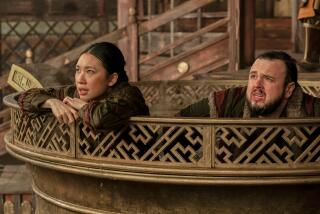New sci-fi books share stories of displaced aliens, giant walls and political intrigue in a fantasy palace
Science fiction has a way of focusing our attention on issues that have otherwise been overlooked or not given the exposure they might otherwise deserve. Done well, a book of the genre can act as a virtual soapbox, broadcasting sometimes dangerous topics in a safer environment to our own reality.
This year there have been a number of outstanding science fiction stories brought to life. From books about the end of the world and life patrolling an endless wall to a new fantasy book that will end up on the small screen, we’ve examined three of the best recent releases.
“Our Child of the Stars” by Stephen Cox (Jo Fletcher Books)
It’s 1969, the year of the moon landings, Woodstock and the ongoing Vietnam war. Against this backdrop, Gene and Molly Myers have been having a rough time since their child died some years before. Molly has turned to drink and Gene the arms of another woman. Then a meteor strikes their New England town, only it turns out not to be a space rock but a spacecraft. Being a nurse, Molly is given the task of caring for the gravely ill survivor – an alien child called Cory.
Most tales of child aliens visiting our planet depict them as almost human, at least in appearance. Superman easily passes as a human reporter and only his abilities mark him as different. Even E.T. is basically human-shaped (two arms, two legs and a head) even if the proportions are all wrong. Cory isn’t like that, there is no way he could pass as human, not even draped with a bedsheet during Halloween like Spielberg’s alien. Cory’s difference to others highlights the real messages that have been tenderly provided here – those of acceptance, warmth of human spirit along with parental love and sacrifice. It’s a wonderfully emotional, heart-warming journey of what it really means to be a parent and a reminder that at times it feels like society as a whole hasn’t really become any more accepting of those who are different since the 1960s.
“The Wall” by John Lanchester (Faber & Faber)
What can be more topical than a book about a huge, expansive, impenetrable wall? The walls shown here however are on a scale that Trump can only dream of. I can imagine the current American president struggling to read this though: on the one hand it features one of his favorite things — walls — but here the barrier has been raised as a result of catastrophic climate change, which he doesn’t seem to believe in. John Lanchester’s allegory is set in a dystopian future where sea levels have risen so high that the surviving countries have had to barricade themselves behind wall defenses.
The dystopian sub-genre – which describes an opposite of “utopia” where society has become unpleasant and dehumanized — has become increasingly popular this century, especially in the last few years.
“The Wall” is one of the best recent examples. It’s bold and confident fiction that highlights the current American and British issues of Trumpism and Brexit. It also examines the increasingly wide social and political divide of the young and the old. Lanchester argues that it’s not so much the dangers of modern society but the seeming collective indifference to increasingly extreme behaviors of the people in charge that are the most worrying.
“The Ruin of Kings” by Jenn Lyons (Tor)
A debut novel from a promising author, “The Ruin of Kings” has just been optioned by Annapurna for a TV fantasy series. Impressive considering it’s only been in print for just a short time.
The first in a planned five-book series, the novel is firmly in the realms of “epic fantasy” — in a similar vein to “Game of Thrones” and “The Lord of the Rings.”
Protagonist Kihrin grew up in the slums of the vibrant city of Quur, learning to steal and entertain through music at a young age in order to earn his keep. Then he finds out that he’s actually the missing son of a prince and is thrown into palace life, full of political intrigue and ruthless power plays.
The story is told through two parallel narrative flashbacks as Kihrin sits in a cell and is forced to recount how he ended up here to his jailer, while his jailer also recounts what she knows of the events leading up to the present.
It’s an impressive and highly accomplished debut, with a fast-pace, an elaborate story and some well-developed characters. What really sets the book apart though is the world that the author has created, full of magic and dragons, gods, prophecies and all manner of evil creatures. A prophecy about the protagonist breaks with the norm by suggesting that he is destined to destroy the world, not save it. “The Ruin of Kings” makes both an ideal introduction to the epic fantasy and a rewarding read for fans of the genre.
Jones is a writer and editor of the website sfbook.com.
More to Read
Sign up for our Book Club newsletter
Get the latest news, events and more from the Los Angeles Times Book Club, and help us get L.A. reading and talking.
You may occasionally receive promotional content from the Los Angeles Times.






